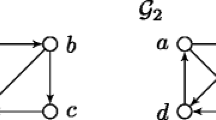Abstract
Logic programs under answer set semantics have become popular as a knowledge representation formalism in Artificial Intelligence. In this paper we investigate the possibility of using answer sets for qualitative decision making. Our approach is based on an extension of the formalism, called logic programs with ordered disjunction (LPODs). These programs contain a new connective called ordered disjunction. The new connective allows us to represent alternative, ranked options for problem solutions in the heads of rules: A × B intuitively means: if possible A, but if A is not possible then at least B. The semantics of logic programs with ordered disjunction is based on a preference relation on answer sets. We show that LPODs can serve as a basis for qualitative decision making.
Similar content being viewed by others
Reference
C. Baral M. Gelfond (1994) ArticleTitle‘Logic Programming and Knowledge Representation’ Journal of Logic Programming 19 IssueID20 73–148
S. Benferhat D. Dubois H. Fargier H. Prade (2000) ‘Decision, Nonmonotonic Reasoning and Possibilistic Logic’ J. Minker (Eds) Logic-Based Artificial Intelligence Kluwer Academic Publishers Dordrecht
Boutilier C. 1994. ‘Towards a Logic for Qualitative Decision Theory’. Proc. Principles of Knowledge Representation and Reasoning KR-94 pp. 75–86.
Boutilier C., Brafman R.I., Hoos H.H., Poole D. 1999. ‘Reasoning with Conditional Ceteris Paribus Preference Statements’. in Proc. UAI-99.
G. Brewka (1996) ArticleTitleWell-Founded Semantics for Extended Logic Programs with Dynamic Preferences’ Journal of Artificial Intelligence Research 4 19–36
Brewka G. 2002. ‘Logic Programming with Ordered Disjunction’. in Proc. AAAI-02.
G. Brewka T. Eiter (1999) ArticleTitle‘Preferred Answer Sets for Extended Logic Programs’ Artificial Intelligence 109 297–356 Occurrence Handle10.1016/S0004-3702(99)00015-6
Brewka G., Benferhat S., Le Berre D. 2002a. ‘Qualitative Choice Logic’. in Proc. Principles of Knowledge Representation and Reasoning KR-02 available as IfI-Report under www.informatik.uni-leipzig.de/brewka.
Brewka G., Niemelä I., Syrjänen T. 2002b. ‘Implementing Ordered Disjunction Using Answer Set Solvers for Normal Programs’. in Proc. 8th European Conference on Logics in Artificial Intelligence (JELIA 2002).
Delgrande J., Schaub T., Tompits H. 2000. ‘Logic Programs with Compiled Preferences’. Proc. European Conference on Artificial Intelligence Berlin, pp. 464–468.
J. Doyle R. Thomason (1999) ‘Background to Qualitative Decision Theory’. AI Magazine 20 IssueID2 55–68
D. Dubois D.L. Berre H. Prade R. Sabbadin (1999) ArticleTitle‘Using Possibilities Logic for Modeling Qualitative Decision: ATMS-Based Algorithms’ Fundamenta Informaticae 34 1–30
Eiter T., Leone N., Mateis C., Pfeifer G., Scarcello F. 1998. ‘The KR System dlv: Progress Report, Comparisons and Benchmarks’. in Proc. Principles of Knowledge Representation and Reasoning KR-98.
M. Gelfond V. Lifschitz (1991) ArticleTitle‘Classical Negation in Logic Programs and Disjunctive Databases’ New Generation Computing 9 365–385 Occurrence Handle10.1007/BF03037169
Grosof B. 1999. ‘DIPLOMAT: Compiling Prioritized Rules into Ordinary Logic Programs for E-Commerce Applications (Intelligent Systems Demonstration Abstract)’. in Proc. AAAI-99.
Lang J. 1996. ‘Conditional Desires and Utilities – An Alternative Logical Approach to Qualitative Decision Theory’. in Proc. 12th European Conference on Artificial Intelligence ECAI-96 pp. 318-322
V. Lifschitz (2001) ArticleTitleAnswer Set Programming and Plan Generation’ Artificial Intelligence Journal 138 IssueID1–2 39–54
Niemelä I., Simons P. 1997. ‘Efficient Implementation of the Stable Model and Well-Founded Semantics for Normal Logic Programs’. in Proc. 4th Intl. Conference on Logic Programming and Nonmonotonic Reasoning Springer Verlag, Dagstuhl, Germany.
D. Poole (1997) ArticleTitle‘The Independent Choice Logic for Modelling Multiple Agents under Uncertainty’ Artificial Intelligence 94 IssueID1–2 7–56
C. Sakama K. Inoue (1994) ArticleTitle‘An Alternative Approach to the Semantics of Disjunctive Logic Programs and Deductive Databases’ Journal of Automated Reasoning 13 145–172 Occurrence Handle10.1007/BF00881915
L. Savage (1954) The Foundations of Statistics Dover New York.
Schaub T., Wang K. 2001. ‘A Comparative Study of Logic Programs with Preference, Proc. Intl. Joint Conference on Artificial Intelligence IJCAI-01 pp. 597-602.
Soininen T. 2000. ‘An Approach to Knowledge Representation and Reasoning for Product Configuration Tasks’. Ph.D. dissertation, Helsinki University of Technology, Finland.
L. Torre Particlevan der E. Weydert (2001) ArticleTitle‘Parameters for Utilitarian Desires in a Qualitative Decision Theory’ Applied Intelligence 14 285–301 Occurrence Handle10.1023/A:1011246803923
Author information
Authors and Affiliations
Corresponding author
Rights and permissions
About this article
Cite this article
Brewka, G. Answer Sets and Qualitative Decision Making. Synthese 146, 171–187 (2005). https://doi.org/10.1007/s11229-005-9084-7
Issue Date:
DOI: https://doi.org/10.1007/s11229-005-9084-7




